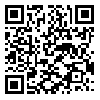Volume 16, Issue 6 (September 2018)
Nursing and Midwifery Journal 2018, 16(6): 423-431 |
Back to browse issues page
Download citation:
BibTeX | RIS | EndNote | Medlars | ProCite | Reference Manager | RefWorks
Send citation to:



BibTeX | RIS | EndNote | Medlars | ProCite | Reference Manager | RefWorks
Send citation to:
namadi F, Hemmati Maslakpak M, Moradi Y, Ghasemzadeh N. THE EFFECT OF PROFESSIONAL ETHICS EDUCATION THROUGH CASE-BASED METHOD ON MORAL SENSITIVITY IN NURSING STUDENTS: A CLINICAL TRIAL STUDY. Nursing and Midwifery Journal 2018; 16 (6) :423-431
URL: http://unmf.umsu.ac.ir/article-1-3508-en.html
URL: http://unmf.umsu.ac.ir/article-1-3508-en.html
1- urmia nursing and midwifery faculty
2- Associate Professor, Mother and Child Obesity Research Center, Urmia University of Medical Sciences, Urmia, Iran (Corresponding Author) ,hemmatma@yahoo.com
3- Hamadan university of medical science
4- Urmia university of medical science
2- Associate Professor, Mother and Child Obesity Research Center, Urmia University of Medical Sciences, Urmia, Iran (Corresponding Author) ,
3- Hamadan university of medical science
4- Urmia university of medical science
Abstract: (7112 Views)
Background & Aim: Nursing students whose future nurses, are the largest provider of health services and will have a critical role in health care. Therefore, with regard to the profession's importance and social status, Nurses, along with clinical competencies, should have ethical competencies to provide appropriate and professional care. Therefore the present study was conducted to determine the effect of teaching professional ethics through case-based method on moral sensitivity of nursing students at Urmia nursing and midwifery faculty in 2016.
Materials & Methods: In this clinical trial study, 73 nursing students who had not passed the ethic course were recruited to the study through the census method. Using a table of random numbers, participants were randomly assigned to a 37‑person CBL group and a 36‑person lecture group. Using the Lutzen moral sensitivity questionnaire a pre-test was performed of both groups before the intervention. Ethics education was done in both groups for two months and a half. Educational contents were the same in both groups and the only difference was the type of educational method. One month after the intervention, the moral sensitivity questionnaire was completed again by the two groups. Data were analyzed by SPSS 16 (v. 16.0, SPSS Inc., Chicago, IL, USA) statistical software, independent t-test, paired t-test and Chi-square test.
Results: No statistically significant difference was found between the intervention and the control groups regarding the pretest mean score of moral sensitivity (p = 0.22), But after the intervention, the mean score of moral sensitivity in the case-based group were significantly increased compared to the lecture group (p = 0.04).
Conclusions: A case-based approach to ethics education is more effective than the routine method in promoting nursing students’ moral sensitivity and promoting moral sensitivity is a major contributor to providing better nursing care. It is, therefore, recommended that this method be used while imparting professional ethics education.
Send email to the article author
| Rights and permissions | |
 |
This work is licensed under a Creative Commons Attribution-NonCommercial 4.0 International License. |






 gmail.com, unmf
gmail.com, unmf